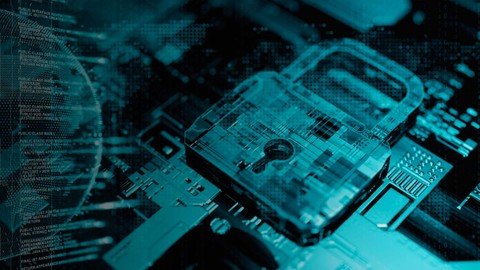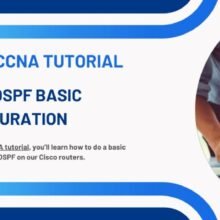Cisco OSPF Basic Configuration In this Cisco CCNA tutorial, you’ll learn how to do a basic configuration of OSPF on our Cisco routers. Scroll down for the video and also text…
EC0-349 – EC Council Computer Hacking Forensic Investigator

Practice Exams for Computer (Digital) Forensic Investigators
EC0-349 – EC Council Computer Hacking Forensic Investigator: Unraveling the Secrets of Cybercrime Investigation
Introduction: In an era dominated by technology, cybercrime has emerged as a significant threat to individuals and organizations worldwide. The EC0-349 – EC Council Computer Hacking Forensic Investigator (CHFI) certification offers a comprehensive training program designed to equip cybersecurity professionals with the skills and knowledge needed to investigate and analyze cyber incidents effectively. This blog delves into the importance and advantages of the EC0-349 CHFI course, the key components covered in the training, and how this certification can empower professionals to become proficient cybercrime investigators. Whether you are a seasoned cybersecurity expert or an aspiring professional, EC0-349 CHFI opens the door to a world of opportunities in the fight against cybercrime.

Section 1: Understanding Cybercrime Investigation
- Overview of cybercrime and its impact on individuals and organizations.
- The significance of digital evidence in cybercrime investigations.
- The role of a Computer Hacking Forensic Investigator in addressing cyber incidents.
Section 2: The EC0-349 CHFI Certification: Advantages and Importance
- Advantages of earning the EC0-349 CHFI certification for cybersecurity professionals.
- The global recognition and credibility of EC Council certifications.
- Career opportunities and salary potential for certified CHFI professionals.
Section 3: Core Concepts Covered in EC0-349 CHFI Course
- Understanding the principles of computer forensics and its applications.
- Acquiring and preserving digital evidence in a forensically sound manner.
- Recovering deleted data and performing file system analysis.
Section 4: Investigating Network Intrusions
- Tracing the origins of network attacks and identifying their footprints.
- Analyzing network traffic and detecting malicious activities.
- Extracting vital evidence from network logs and systems.
Section 5: Data Acquisition and Examination
- Employing forensic tools for data acquisition and analysis.
- Identifying hidden and encrypted files in storage media.
- Conducting keyword searches and data carving to discover crucial evidence.
Section 6: Mobile Forensics Investigation
- Investigating digital evidence on mobile devices.
- Recovering data from smartphones and tablets.
- Analyzing mobile applications and extracting data from mobile backups.
Section 7: Evidentiary Procedures and Legal Considerations
- Adhering to legal and ethical guidelines in handling digital evidence.
- Preparing and presenting expert witness testimony in court.
- Understanding the legal implications of digital investigations.
Sales Pitch for EC0-349 – EC Council Computer Hacking Forensic Investigator Course:
- Introduce the EC0-349 – EC Council Computer Hacking Forensic Investigator course.
- Emphasize the hands-on approach and real-world scenarios that make the course engaging and practical.
- Highlight the expertise of our certified instructors and their extensive experience in cybercrime investigations.
- Showcase the global recognition and credibility of EC Council certifications.
- Offer a special limited-time discount or exclusive package to entice learners to enroll in the course.
Conclusion: In conclusion, the EC0-349 – EC Council Computer Hacking Forensic Investigator certification is a game-changer for professionals seeking to excel in cybercrime investigation. With the increasing threat of cybercrime, the demand for skilled CHFI professionals has skyrocketed. The EC0-349 CHFI course equips learners with the tools and techniques to identify, investigate, and mitigate cyber incidents effectively. By earning this prestigious certification, individuals can enhance their career prospects, gain credibility in the cybersecurity domain, and contribute significantly to the fight against cyber threats. Invest in your future today and join the ranks of certified Computer Hacking Forensic Investigators who are shaping a safer digital landscape.
In this course, you will get 5 Full Length Practice Exams with 300 Unique Questions from “EC-Council EC0-349 Computer Hacking Forensic Investigator CHFI” covering all the topics for the Exam.
Updated to latest questions

What do you get in this course?
- 5 mock tests with 60+ Unique Questions in each practice test.
- 300 Latest Questions
- Questions are frequently reviewed and updated frequently.
- Practice tests are created by Subject Matter Experts and the questions always stay current with the actual exam.
- 100% verified answers
Exam Demo
EC0-349 Computer Hacking Forensic Investigator
QUESTION 1
When an investigator contacts by telephone the domain administrator or controller listed by a Who is lookup to request all e-mails sent and received for
a user account be preserved, what USC statute authorizes this phone call and obligates the ISP to preserve e-mail records?
A. Title 18, Section 1030
B. Title 18, Section 2703(d)
C. Title 18, Section Chapter 90
D. Title 18, Section 2703(f)
Correct Answer: D
QUESTION 2
Item 2If you come across a sheep-dip machine at your client site, what would you infer?
A. A sheep-dip coordinates several honeypots
B. A sheep-dip computer is another name for a honeypot
C. A sheep-dip computer is used only for virus-checking.
D. A sheep-dip computer defers a denial of service attack
Correct Answer: C
QUESTION 3
In a computer forensics investigation, what describes the route that evidence takes from the time you find it until the case is closed or goes to court?
A. rules of evidence
B. law of probability
C. chain of custody
D. policy of separation
Correct Answer: C
QUESTION 4
How many characters long is the fixed-length MD5 algorithm checksum of a critical system file?
A. 128
B. 64
C. 32
D. 16

Correct Answer: C
QUESTION 5
You are working on a thesis for your doctorate degree in Computer Science. Your thesis is based on HTML, DHTML, and other web-based languages
and how they have evolved over the years.
You navigate to archive and view the HTML code of news. You then navigate to the current news website and copy over the source code.
While searching through the code, you come across something abnormal: What have you found?
A. Web bug
B. CGI code
C. Trojan downloader
D. Blind bug
Correct Answer: A
More Practice tests
Practice Test 1:
- What does EC0-349 stand for in the context of cybersecurity certifications? a) Ethical Hacker Certification b) EC Council Computer Hacking Forensic Investigator c) Certified Incident Handler d) Cybersecurity Expert Certification Answer: b) EC Council Computer Hacking Forensic Investigator
- Which role is primarily responsible for investigating cyber incidents and analyzing digital evidence? a) Chief Information Officer (CIO) b) System Administrator c) Computer Hacking Forensic Investigator (CHFI) d) Network Engineer Answer: c) Computer Hacking Forensic Investigator (CHFI)
Practice Test 2:
- What is the primary objective of a Computer Hacking Forensic Investigator? a) To conduct ethical hacking assessments b) To prevent cyber incidents from occurring c) To recover lost data from storage devices d) To investigate and analyze cybercrime incidents Answer: d) To investigate and analyze cybercrime incidents
- Which of the following is a crucial skill for a CHFI professional? a) Network design and architecture b) Software development c) Data analysis and forensics d) System administration Answer: c) Data analysis and forensics
Practice Test 3:
- What is the significance of preserving digital evidence in a forensically sound manner during an investigation? a) It ensures the evidence is admissible in court. b) It guarantees that no evidence is lost during the investigation. c) It speeds up the investigation process. d) It helps prevent future cyber incidents. Answer: a) It ensures the evidence is admissible in court.
- Which phase of a forensic investigation involves identifying and collecting potential evidence? a) Acquisition b) Examination c) Preservation d) Identification Answer: d) Identification
Practice Test 4:
- What does the CHFI course cover in terms of network intrusion investigation? a) Identifying potential hacking targets b) Identifying vulnerabilities in network devices c) Tracing the origin of network attacks d) Creating firewall rules Answer: c) Tracing the origin of network attacks
- During the process of data acquisition, which of the following should be avoided to maintain the integrity of evidence? a) Using hashing algorithms b) Creating forensic duplicates c) Taking screenshots of the data d) Modifying the original data Answer: d) Modifying the original data
Practice Test 5:
- What is the primary goal of conducting mobile forensics investigations? a) Recovering data from damaged hard drives b) Analyzing network traffic c) Identifying vulnerabilities in mobile applications d) Extracting data from mobile devices Answer: d) Extracting data from mobile devices
- Which legal consideration is essential for a CHFI professional during an investigation? a) Identifying potential suspects b) Obtaining a search warrant c) Sharing investigation details on social media d) Engaging in vigilantism Answer: b) Obtaining a search warrant
About Official Exam and other certification details are below:
- Number of Questions: 125
- Test Duration: 4 hours
- Test Format: Multiple choice
- Test Delivery: ECC EXAM, VUE
- Exam Prefix: EC0-349 EC-CHFI
Passing Score

The individual rating then contributes to an overall “Cut Score” for each exam form. To ensure each form has equal assessment standards, cut scores are set on a “per exam form” basis. Depending on which exam form is challenged, cut scores can range from 60% to 85%.
Who Is It For?
The Certified Ethical Hacking training course will significantly benefit security officers, auditors, security professionals, site administrators, and anyone who is concerned about the integrity of the network infrastructure.
Eligibility Criteria for Official Exam:
In order to be eligible to attempt EC-Council CEH, certification examination, candidate may opt to:
- Attend Official Hacking Training:
If a candidate have completed an official EC-Council training either at an Accredited Training Center, via the iClass platform, or at an approved academic institution, the candidate is eligible to attempt the relevant EC-Council exam without going through the application process. - Attempt Exam without Official Hacking Training:
In order to be considered for the EC-Council CEH exam without attending official hacking training, candidate must have at least 2 years of work experience in the Information Security domain and remit a non-refundable eligibility application fee of USD 100.00 along with their application form
.







